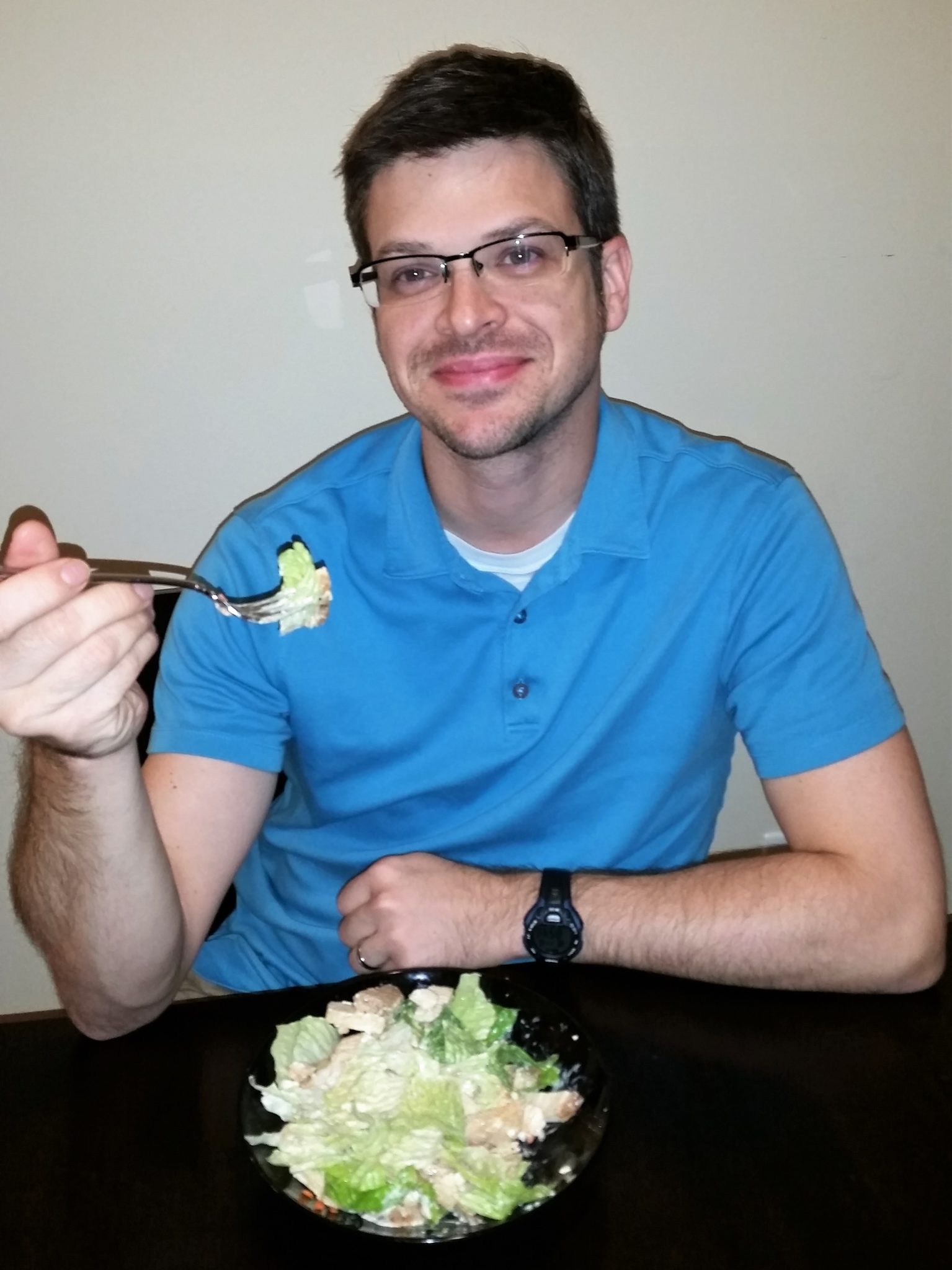Have you ever wondered what goes through the mind of a picky eater? What makes them judge a food before they have tried it?! Why does their stomach lurch just at the thought of a food?! What makes them open up to new flavors, tastes and food experiences?
If you have ever wondered ‘What can I say, do, share, or encourage?’ with someone you know that has very selective and unique food preferences, you are not alone! I wondered that for years and with a lot of trial and error, finally found some Sanity Saving Strategies that I use on a daily basis. If you haven’t read Living with a Picky Eater Part 1 or Part 2, definitely read these first! But today, I want to explain this topic from another angle, the perspective of a ‘picky eater.’
My husband… MY ‘picky eater’ has graciously allowed us into his world, sharing his thoughts, feelings, and opinions on all things food. He is candid and direct about what has contributed to his eating habits and where he is today. While Stephen cannot speak for every picky eater, I hope this conversation proves enlightening for you as you navigate the sticky, messy course of living with and loving a picky eater.

What type of language and attitudes encourage you to try new or unfamiliar foods?
Direct language; clear and concise without pretense. The person asking should not have an agenda and remain flexible and open-minded. Often the case is that if there is one person who is open minded the other will be more apt to have an open mind as well.
What type of language and attitudes disinterest or repel you from trying new or unfamiliar foods?
Any pressure, judgment, irritation, or very frequent request. This will turn on the ‘rebellion response’ and the eater is likely to become very defensive.
What does it feel like to go to a party or gathering? How do you prepare yourself?
If I have advance knowledge of the menu or an idea of the food choices that will be available, this will help me decide if there is something that I will want to eat at the gathering. Sometimes I eat a snack or light meal before an event so that I can ‘fake it’ until we get back home where I can have a meal.
I have been living with my selective eating since childhood- it is something I am changing, but I am confident in who I am. I am not easily pressured into eating something I don’t usually eat or dislike in order to please the host or fit in with the crowd. My food habits have been the center of conversation many times, but it doesn’t bother me. I also am not concerned about offending my host if I don’t eat what they have prepared. I thank them anyway and inform them that I have some very strong taste and texture aversions that will result in a very unpleasant result if I attempted to eat it.
Have you been a picky eater for the entirety of your life or has it gotten better/worse? What are some events or things that have contributed to your dietary choices and behaviors?
I have been a picky eater for a long time. I actually don’t remember when I use to eat the foods that my parents said I use to eat. I feel like my childhood developed stronger reactions as I grew up. In the past 5-7 years, I have worked to change some of the ways I view food and what I don’t eat. Being married to Jennifer has helped drastically because she encourages me and takes off her ‘Dietician hat.’ When she does that, I can tell she is trying to love me and has a vested interest in my health and my desire to change, rather than her desire to change me.
What makes you more likely to try a new food?
Foods need to be prepared in a way that is appealing and appetizing. It must be presented in a non-threatening environment (home, not a party). Also, I usually need to give myself some pep talks in advance to be ready and adventurous to try a new food.
What makes you less likely to try a new food?
Being told, expected or commanded to try a food. My mom had a handful with me, and I could see the pity in her eyes toward Jennifer when we were getting married. She tried for years to convince me to eat my fruits and vegetables. I remember one time she told me that I couldn’t get up from the dinner table until I ate all my corn. After an hour at the dinner table, she finally told me to clear off my plate and go to bed. I can become very stubborn and defensive when it comes to pressure at the dinner table.
Have you tried any new food and been surprised? What happened?
My wife encouraged me to try hummus- it was during a non-meal time. She explained what was in the hummus and then shared that the pita that came along with it was really good too (if she says a carb is ‘good,’ that means it is definitely worth eating!!). So I tried it when she wasn’t even looking. I must say, hummus is pretty tasty.

When you say you don’t like something but haven’t really tried it or not in many years, what exactly is going through your head?
Usually, my first thought is a memory of how something tasted or felt when eating it. Then, I begin wrestling with reasoning to determine if I am open to test, try or taste it again. My decision is usually dependent on the circumstance of how, who and where the food in question is brought up.
So the setting and environment for food discussions are pretty monumental when it comes to trying new foods?
Yes.
How can you encourage a spouse or family member of a picky eater?
Well, as much as you might want to say, “Man up and eat…and you better like it!”, you will likely have more success if you find out if the selective eater wants to change or has any concerns with his/her eating habits.
If the individual does indicate even a slight desire to make some changes, then begin to have some open dialog with them to see what holds them back (taste, texture, experiences). Armed with knowledge, it will be easier to find ways to support them through the change process, as slow as it might be.
How do you determine what you are willing to try next? Is there any methodology or patterns we should notice? Or, do you decide on a whim? Or, do you prepare yourself for days, weeks, months… before you actually take the first bite?
That varies greatly. Lettuce took months of mental preparation and a strong affinity for ranch dressing. Trying hummus was on a whim. There is no methodology or pattern, but most things that look and smell really good will take significantly less time.
Does helping prepare or cook an unfamiliar food make you more likely or less likely to actually try it?
I think it does have an influence, but not a very significant role. I have helped my wife cook broccoli for many years and I don’t have the slightest of interest in trying it… yet.
How do you feel about your dietary preferences? Are you okay with them? Do you have any concerns about them?
My preferences are something I would like to change. But, if I don’t gain any new foods, I will be happy and content with the fact that I have already made several positive changes in my eating habits. I just need to make sure that I don’t overdo the carbs and sugar (HUGE sweet tooth!)
When someone shows concern for your health after learning about your eating habits, how does that make you feel?
Depends on how well I know them. For me to receive concern about my health and for me to feel that is it genuine, they need to be a close friend. It took me two years to learn that my wife has a genuine concern for my health and wants to make sure that I live well and long.
What do you think will be the next food you decide to try? Are you contemplating any right now?
Pomegranate… Or melon. I haven’t decided yet.
Any reasons why you chose those fruit??????????
Nope. No patterns, no reasons.
What is the 1 QUESTION a family member should NOT ask?
It’s hard to say one question not to ask. I have been asked practically every question there is to ask and they don’t really bother me. I can say that when people find out about my taste/texture aversions and are respectful of that, I am very appreciative of them.
If the picky eater becomes defensive, what is the best way to calm the situation and reiterate a teammate strategy?
Step back and say you are sorry for the pressure. The picky eater does not want to react defensively, but it is a natural response. Ensure that you are not saying that they need to eat something or try something new, just that you are interested and curious about their openness to the food.
Have you ever been offended or hurt by someone’s response to your eating habits?
The only person that hurt me with their response was my wife when were first married. She had a hard time accepting that some people have very strong reactions to eating certain foods and pressured very hard for me to expand my food “vocabulary”. Obviously, she has learned how to speak to me and I learned how to open up and not be so defensive. But that is the only occasion I can remember.
What do you feel is a good way to come together to meal plan with such drastically different food preferences? What do you feel has worked and what has not?
What has helped the most is when Jennifer has researched different recipes for us to try and I was able to look them over and say, “sure we can try that.” This has drastically improved our meal planning and ensures that we both are satisfied with variety and consistency.

Sometimes individuals feel like picky eaters control (directly or through passive aggressive ways) meal planning and preparations. How can you respond to this and how should we address this if we feel that the selective eater is controlling?
I am sure that there is some level of manipulation among ‘selective eaters’ as we like what we like. But, it isn’t any different from someone using pressure and persuasion to convince the picky eater to try different foods. The issue is whether the 2 people can come together to compromise.
As a picky eater, I know that I severely limit the recipes Jennifer wants to cook. I try to agree upon recipes that are easy to modify. Also, I offer and encourage her on occasion to make a recipe she really wants to make, without considering my food preferences. On those nights, I just make a sandwich or something easy. That’s my way of compromise.
How do you feel about your progress so far? Do you feel you have come a long way? Have a long way to go?
I feel like my progress has been steady, but I do have a ways to go. There are foods that I would like for my daughter to see me eat and for her not to know that her father was a picky eater.
How do you feel you can set a good example for your children with your current dietary habits? What are you trying to teach and exemplify?
I want to teach them that there is no pressure when they are trying new foods, but to enjoy what each food has to offer and the different taste and variety that comes with that.
TRUTH: Man does not live on bread alone but on every word that comes from the mouth of the Lord. –Deuteronomy 8:3b (NIV)
